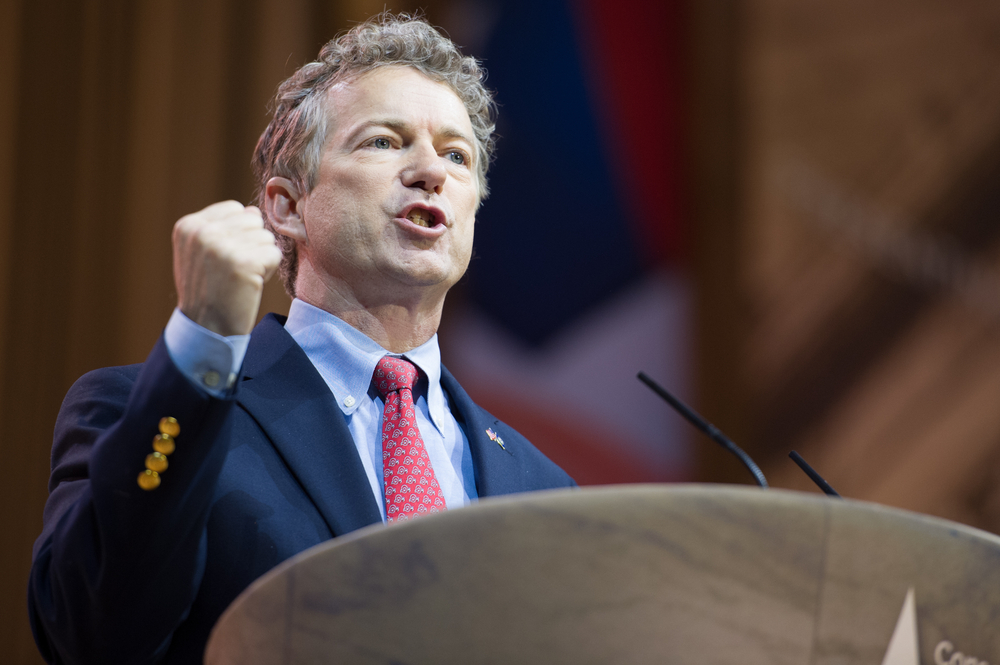Senator Rand Paul, having recently taken on the GOP’s foreign policy wing in his battle against the PATRIOT Act, has been in need of a good ol’ red-meat plan to throw at the Republican primary electorate to restore his bona fides. And so he’s come up with a flat-tax plan that will blow up the revenue side of the federal budget. That’ll do.
Paul would apply a 14.5% flat tax to everything: “personal income, including wages, salaries, dividends, capital gains, rents and interest,” as well as corporations. It would do away entirely with the gift and estate taxes, all tariffs, and payroll taxes. On the plus side, he would exempt the first $50,000 in income for families of four and retain the earned-income tax credit.
What this looks like is… (drumroll)… a massive tax cut for the wealthy and corporations with a few bones thrown at lower- and middle-income people. A shocking turn of events!
The plan would raise taxes on those at the bottom, unless they’re married with a couple of kids, and dramatically reduce taxes on the top. Yes, corporations and rich people use all sorts of loopholes and deductions to pay lower effective tax rates. But responsible tax reform proposals that lower rates while simplifying the tax code generally try to come up with a number in the middle. This one just brings the marginal rates all the way down to Mitt Romney’s effective tax rate, which was pretty clearly determined in the 2012 election to be too low.
Paul does not eliminate all deductions from the tax code, either. He maintains two big ones: the mortgage interest deduction and the charitable deduction. The mortgage interest deduction is $70 billion annual tax expenditure whose benefits largely accrue to the wealthy: the bigger the house, the bigger the tax deduction. The charitable deduction costs the government $50 billion or so per year, and offers massive write-offs for the wealthy. Let’s just say that not all of that “charity” involves giving poor people food, either. Hedge fund billionaire John Paulson just dropped $400 million into Harvard’s already overflowing coffers to get an engineering school named after himself. That will come off of his tax bill.
The elimination of the gift and estate taxes, obviously, does absolutely nothing to help lower- or middle-income families, but it does ensure the clean transfer of hereditary wealth from generation to generation.
So how does Paul intend to make up these $2 trillion dollars over the course of a decade? He doesn’t even pretend to call this a revenue-neutral tax reform proposal, so we should at least give him credit for that sort of honesty.
But that’s about where the credit ends. He claims that his plan will be paid-for through a combination of supply-side magic tricks and vague spending cuts that will not just bring the budget into balance but “would actually reduce the national debt by trillions of dollars over time.” The plan was drafted “in consultation” with three of the Republican party’s supply side figures — “the Heritage Foundation’s Stephen Moore, former presidential candidate Steve Forbes and Reagan economist Arthur Laffer” — who believe to their core that massive reductions in the tax burdens of wealthy people and corporations are the only thing holding the American economy back from broad-based prosperity and, thus, increased federal tax receipts. To supply-siders, no matter how many times taxes have been cut in the last 30-some years, we are always and forever situated perilously on the downward slope of the Laffer Curve.
And what about his spending cuts? His spokesperson “pointed to spending cuts he detailed in past budget proposals” for those, according to the Wall Street Journal, and of course they are not kind to the spending priorities of working people:
A plan he released in 2013, which he said would balance the budget in five years, called for deep cuts in the Pentagon and foreign aid, revamping Social Security to allow people to save in private accounts, abolition of the Department of Education and three other cabinet departments, and replacing food stamps and welfare with state block grants.
Things have changed since 2013, too: in the most recent budget debate, he introduced an amendment to dramatically increase the Pentagon’s budget at the expense of other discretionary spending priorities.
Eliminating the payroll taxes indeed makes for a nice paycheck increase for workers, but how would he make up the Social Security and Medicare shortfalls? His plan, according to the WSJ, “specifies that incoming business-tax revenues go first to fund those programs.” Corporate taxes don’t bring in nearly as much money as payroll taxes do, and that’s before Rand Paul plans to cut corporate taxes. Perhaps corporates taxes will be enough to cover Social Security and Medicare, though, after Rand Paul cuts the hell out of those programs.
There’s a big debate on the right this primary cycle about the merits of flat-tax plans versus “Reformicon” ones that won’t completely throw out the IRS code. But they’re all ideologically and strategically the same: they will dramatically slash taxes on the wealthy while offering up one or two breaks for everyone else to serve as amulets against charges of unfairness. In 2012, Mitt Romney’s plan was to cut the dickens out of top tax rates, but — but! — he also would have eliminated capital gains and dividend taxes for people earning less than $200,000 per year. (We all know what a burden capital gains taxes are on working people.) Marco Rubio, the leading “Reformicon” candidate, has a plan that would eliminate the capital gains tax entirely, but would bump up the child tax credit. In all cases, federal receipts are hammered, wealth trickles upward, and budget cuts target the poor. It’s not all that exciting of a debate.

